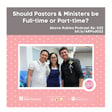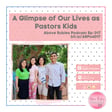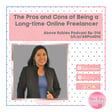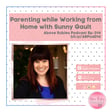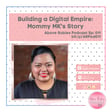Become a Creator today!Start creating today - Share your story with the world!
Start for free
00:00:00
00:00:01

ARP 008 - Parenting Talks with Dr. Berry Pierre
In today's episode, I am joined with my client for almost 2 years, Dr. Berry Pierre, who is a board-certified internet, podcaster of the Lunch and Learn with Dr. Berry and the founder of Pierre Medical consulting. Join us as we talk about how he juggles life and work, sibling rivalry, parenting a child with autism, and quality time with kids.
Dr. Berry's channels:
Web: www.drberrypierre.com
Facebook: Dr. Berry Pierre
Instagram: Lunch and Learn With Dr. Berry (@lunchlearnpod) & Dr. Berry (@drberrypierre)
Twitter: @drberrypierre
Connect with me via the following platforms:
Website: www.abovepreciousrubies.com
Twitter: @AboveRubiesBlog
Instagram: @AboveRubiesBlog
Facebook: @Above Rubies Blog
Transcript
Introduction to Parenting Podcast
00:00:03
Speaker
Thank you for listening above Ruby's podcast, created by a mom for every mom and parents for that matter, embracing parenthood and sanity. Here to help you get by through weekly discussions and parenting, relationships, home and faith as you juggle daily in life.
Meet Dr. Berry: Parent and Professional
00:00:23
Speaker
All right. Hello, everyone. Today, I am very excited because I am with my client, Dr. Berry. He's going to be my guest today for this podcast episode. This is going to be the second time that I'm interviewing Dr. Berry. The first time was when I was asking questions about freelancing. And now I'm so happy he said yes again, because that's how supportive he is to being
Challenges and Joys of Parenting
00:00:50
Speaker
my guest. So Dr. Berry is a
00:00:53
Speaker
certified internist, and he is a founder of PR Medical Consulting as well. We've been working together for more than a year now. How are you, Dr. Berry? Well, first of all, I want to say thank you for inviting me. I was hoping that I did a good job the first time around, so I guess I did, and I got the second invite. I'm very happy and excited.
00:01:16
Speaker
Oh, you definitely did and I'm very honored and so thankful for you. So as you know, Dr. Berry, he's someone who just wears so many hats. I don't know how he's able to manage it, but we can definitely learn a thing or more from him with this episode. So Dr. Berry has three kids of his own. Am I right, Dr. Berry?
00:01:37
Speaker
Yes, my oldest is eight and I have two twins who are five. Yeah, awesome. And they're boy and girl, right? Your twin.
00:01:48
Speaker
Boy and a girl, yeah, so two girls and a boy. Nice, nice, nice. How's parenting so far for you?
Unique Challenges of Raising Different Children
00:01:55
Speaker
You know, what's interesting when we, when we, my, my oldest daughter and, you know, we were kind of going through the ropes because it was me and my wife's first child and we were kind of, you know, going through that process of, you know, really learning how to be parents. Yeah.
00:02:09
Speaker
And we thought we had it all good. So the second go around, we figured like, all right, we got this the first time around. We should be ready for the second go around. And we almost had to start all over again, the type of parenting that we had to do and the process we had to learn.
00:02:25
Speaker
And of course, now having a boy instead of a girl was a whole different process in and of itself. So it's definitely been an amazing adventure and something that every day, I'm shocked and surprised. I'm like, okay, I can't believe I'm a parent. I know. Is it really different how you parent them? How does that work? Because I only have one kid and he's seven.
00:02:49
Speaker
Honestly, I thought we were gonna be able to kind of parent kind of the same style with all of our kids and it would all work the same. And we realized very quickly that every single one of them has their own personality. Everyone of them has their own traits, what makes them special, what makes them happy, what makes them sad. So you almost have to govern accordingly to the Pacific child because everyone just kind of has the way they do their things.
00:03:19
Speaker
Yeah, especially especially my son. My son is he is a troublemaker. He's and he's just so he has so much energy and so much, you know, spunking, you know, a lot of times we just happen to try to curtail and kind of control his energy gives us some sleepless nights.
00:03:35
Speaker
Oh no, but that's not going to be for long because they're going to grow up. So as cliche as it may sound, they say, enjoy while it lasts. Oh, you know, that is so true because it's every day I come from work and I feel like they're doing something new.
00:03:53
Speaker
They're saying something new. They're, you know, they're asking, they just like, you can just see them kind of growing up in your own eyes and you just like, Oh my God, just yesterday I had to carry you just with one arm and now you're just kind of running everywhere. So yeah, you are so true. They like, they definitely grow very quickly.
00:04:09
Speaker
They do. And did you ever have to deal with sibling rivalry since you have twins?
Sibling Dynamics and Autism
00:04:17
Speaker
And then the eldest was just three years older than them. Did you have to deal with sibling rivalries? I know when we first brought the twins home, it was probably one of the most interesting times because my daughter, who is autistic, she didn't really understand what was happening.
00:04:37
Speaker
Like she really like one day she looked and then there was one baby and then especially because my twins didn't come home at the same time and then like probably like a week or so later there was a second baby. So all of a sudden she went from having you know no one right to really play with having two little kids to kind of you know call her own.
00:04:58
Speaker
And, you know, she has just been almost motherly to them. Like she's always trying to direct them, always trying to counsel them, always trying to, you know, play with them and kind of school them and, you know, give them the direction, which is such an amazing thing. But you can see it happen, especially like it doesn't matter.
00:05:15
Speaker
There could be a million toys in the room. They're always going to fight over that one toy. And that's when you see those personalities start coming into play where all of a sudden you're not my friend and I'm not your friend. And it's just a loving robbery. But you could see how it ebbs and flows. They love to be next to each other. But then when they're next to each other, they want to kill each other.
00:05:40
Speaker
Exactly. That's funny. But that's how we grew up as well because my sister was, I'm only a year and a half older than her. So we were like, at one point we were so close and then at one point we would like to really seriously kill each other. It's so funny. But then growing up now, you just look back at it and then just laugh at it.
00:06:04
Speaker
Me and my brother are kind of the same way. We're probably like, we're less than two years apart from each other. And we would go to those same things where we wanted to kill each other and fight. And then now we're just like the best of friends. Or it's just like, I'm not sure when we came back together. I guess once we got old enough and realized we were silly for fighting each other.
00:06:27
Speaker
Exactly. That's really fun. How long do you think did it take for the elders to adjust to the twins? I think even now it's still a day-to-day process because she went through a time frame where she was the only person who was alone. So it wasn't nothing for her to be alone, to play by herself, to have her own toys.
00:06:50
Speaker
And the biggest adjustment of getting her to just kind of learn to kind of share her toys and, you know, not be kind of the big sister who beats up on the little sister and a little brother. Because sometimes she doesn't realize, you know, that she is the bigger sister, that, you know, she's a little bit stronger than him. She's a little bigger than him, so she can't really bully him as much as she can. Exactly.
00:07:14
Speaker
So it's taken some time, but she loves her, she loves her siblings. And that's probably the most important thing that you could just see that love. And you can see again, when they are playing, they'll play for hours together. Yeah. And that's really nice. That's great.
Balancing Work and Fatherhood
00:07:30
Speaker
And since you are, you work at a hospital and I'm pretty sure your schedule is really tight. How do you manage your role as a father to your kids and juggle work and life at the same time?
00:07:43
Speaker
Honestly, especially what happens with work, I can be in the hospital eight to 10, sometimes 12 hours in a day. And one, I always had to champion. Having that support system with my wife who takes a lot of the brunt of the effort is so important because I know I wouldn't be able to do what I need to do at work if I didn't have someone who held down the fort at home.
00:08:10
Speaker
And having the kids at home, it gives you that spark of energy when you are working that eighth hour, that ninth hour, that 10th hour, and understanding that you have someone to go home to. You have kids who are going to be super happy once you touch the door. Even if you're having a bad day, they don't care that you're having a bad day. They're just glad that daddy's home and everyone's happy.
00:08:34
Speaker
about it is always such a motivating factor. And I think that's what really drives me to work and to provide because I know like I have people I have to provide for and they're happy either way, right? If I'm not working, they're happy. Like now my son is like old enough to talk about how he missed me, right? And like, he's like, oh, Poppy, I miss you. Poppy, I miss you. And I'm like, okay, I know. I said, daddy has to go to work though.
00:09:02
Speaker
And it's really sweet it's really heartwarming when they say that they say I love you and they say I miss you It's just and they're so sincere. Oh 100 100% because you get you get really tell they're like
00:09:16
Speaker
I didn't see you when I woke up. Because a lot of times my day has it so that I'm leaving the house before they even wake up. So by the time they wake up, they're like, oh, what happened? Where's Miss Poppy at? And sometimes I'm not getting home until it's close to dinner time. And even when it's close to dinner time, that means they may have maybe an hour
00:09:38
Speaker
or two left before they go in the bed. So there may be some times where I may only spend maybe two hours at max with them during the day. So that's why when I do get home, I try to put everything down and put all my focus to them because I know I only have them for two hours. Let me just take advantage of the two hours now. I'll catch up on my energy and my sleep later.
00:10:02
Speaker
That's awesome. That's a really wonderful reminder for parents. It's not how long you get to spend with them. It's the quality that you're able to bond without any distractions with the kids. And that's something I should remind myself of. Oh, I think you said it.
00:10:19
Speaker
Y'all know, I think you said it right on the head. It really is because if I measured it just by the sheer time I spent with them, then I'd always be sad, right? I'd always be sad because yes, I do work a lot. And yes, that does take away from me spending time with them, especially during the week. And that's why even on the weekends, and of course, my wife has no problem with it. It's almost like, all right, daddy's here. Goodbye.
00:10:48
Speaker
my wife's able to sleep, sleep in. And, you know, I essentially have the kids pretty much the whole day to kind of like play catch up of what I missed during the week. So like, I think that's really, really important, especially for parents out there to understand that you really just got to take advantage of the time you do have.
00:11:07
Speaker
with your children and quality time is important because again, a lot of times we may be in the house, right? We may be in the house with them, right? But if we're not paying them attention, because our mind is elsewhere, we're still busy.
00:11:23
Speaker
you know, thinking of work or thinking of other things outside of them, you know, that can get lost. And I think kids can pick that up. I think kids can pick up when you're not fully attentive to them. And I have kids where if I'm not fully attentive to them, like they might break something. So I got to always put full attention. I can't get your attention. So this is what I'm going to do.
00:11:46
Speaker
Yes, and they know it too. My son, he's so smart. Whenever he's going to do something that he shouldn't be doing, all of a sudden, he closes his door very quietly.
Family Dynamics During Lockdown
00:11:56
Speaker
He locks the door behind them. And I'm like, hold on. And then I hear, then I just hear quiet. And once we know, if we hear that, if we don't hear from my son or you and my daughter, if we don't hear from them, like, hold on, it's too quiet. Ah, yeah. What does Davis do? I need to check on them. Something's not right here.
00:12:16
Speaker
Something's not right. They are way too quiet for me. Let me go find out what they're doing. So speaking of bonding time with kids, now that we're on lockdown, I'm not sure what your situation is now in Florida, but how do you bond with your kids? What are your tips for other families out there who are looking into bonding with their kids? What do you think can we do inside the house?
00:12:39
Speaker
I think one of the biggest things is I find myself playing more of their games, especially because those kids, they have lots of toys and lots of dolls and lots of things around that they're usually doing their really imaginary play by themselves. So now I'm trying to be a part of the team.
00:12:57
Speaker
that's playing with them. Especially if I'm not watching their TV shows or their cartoons. I really try to be really within it. So like, hey, we're doing this together because we have so much time. And they don't get to see their friends. So now I'm their friend.
00:13:18
Speaker
So now that I'm their friend, I have to be their friend. I have to play with them. I have to run around and jump and scream. And I have to do all these things there because they don't get the opportunity to do that with their friends anymore. It's just kind of scarce for them. And again, I think they love it, right? So that's why they hate when they see you go, right?
00:13:39
Speaker
Exactly. And the kids, they have so much energy. That's one thing. Those kids will tire out. They got so much energy. And you're like, all right, let's just rest like, no, no, no, let's play again. Let me rest. I'm already. Yes. Yes. That's our challenge. And they don't they don't want to listen to me. They're like, no, no, let's play the game. Let's play this game.
00:13:57
Speaker
And they'll play it. One thing I realized about kids, they will play a game over and over and over again with no end in sight. And it doesn't get boring to them at all. And they're like, aren't you bored yet? They're like, nope. No, never. Never going to happen. OK. Never going to happen.
00:14:14
Speaker
Like a TV show, we could watch the same. I think I've watched some of these movies probably thousands of times. And the next day I'm like, oh, what do you want to watch? That's the very same movie. And I'm not sure when you moved into the US, but I think if I'm not mistaken, you grew up in Haiti, is that correct?
Parenting Styles: US vs. Haiti
00:14:38
Speaker
Oh no, my parents grew up in Haiti, so I was actually born here. Oh, okay, awesome. Did you notice any difference in the parenting style in US and Haiti? Oh yes, I think in the US, I think it was more of a freer spirit. The kids were allowed to do a lot more and explore a lot more on their own.
00:15:08
Speaker
Versus you know in over in Haiti, especially when I would talk to because I have a lot of cousins who grew up there and they would just talk about how strict it was and how like you were going to do a B and C and that's all you were doing. And that's kind of how they kind of walk that path. And I feel here in the US we had a little bit more.
00:15:27
Speaker
leeway to do what we wanted to do. Sometimes we got in trouble. Sometimes you almost wanted a more restrictive pathway, but they gave you that option to try to explore and kind of be your own person. Yeah, I agree. And in line with that, how does a discipline look like for you? Are you more of a
00:15:50
Speaker
So I'm definitely the strict yeller because they typically aren't used to me raising my voice or talking very stern. So I try to keep it in my back pocket because one, I don't want them to get used to it. I want them to always be surprised when I say their name very stern because I'm trying to get their attention. And they're trying to say, hey, what are you doing? And I want to know, oh, like, hold on. That's a different voice inflection.
00:16:19
Speaker
than I'm used to. So I'm definitely the strict yeller and the one who will just kind of look at it. I like that. I say, what are you doing?
Approach to Discipline
00:16:30
Speaker
What are you doing? And I always ask my kids, what were you thinking? I talk to them, my wife always gets on me, because I talk to them like they're an adult. And the way I think about it, I say, well, I think kids act the way kids act because we talk to them like kids.
00:16:49
Speaker
But if I talk to you like you're an adult, then you'll fall in line. So I'll say, hey, Davis, what were you thinking? What was the thought process there? Why did you do that?
00:17:04
Speaker
That's really great, because I learned to do that as well, to talk to my son like he's an adult, because I was so afraid that he would baby talk, because I found out that that's one of the reasons for speech delays when you baby talk your kids.
00:17:22
Speaker
That's what that's what I was doing. Yeah, no, like in our in our house, you know, we try to have, you know, full. And I think it's even I think it's even more pronounced because our oldest daughter was autistic. So we were always very keen on just the level of speech that we that we had to have. So we didn't want any like mixed messages or we didn't want any way they could be confused. So we'd always kind of talk in that.
00:17:47
Speaker
like, you know, kind of, I guess, I guess, quote unquote, grown up type of tone. So not only could my oldest daughter who was autistic pick up the cues and pick up the tone, but then the youngest can also pick it up as well. And of course that backfires because now my youngest daughter, she's so smart. Like, you can't get nothing by her. Like, everything is like, oh, why do you have to do this? But why am I doing that for? Like, no, you didn't say that.
00:18:16
Speaker
No, I heard you. She has a question for every... So it's kind of that Keshe 22. Now you have an inquisitive child and they're going to ask you a lot of questions. So yeah, now there's no way I could be like, oh, hey, just go in your room. Why do I have to go in my room? Well, it's bedtime. But oh, but I'm not sleepy. I understand you're not sleepy. So you have to explain and break down
00:18:43
Speaker
And that's very good because at an early age they already learned to like discuss things. Yeah, no, no, she's definitely a discusser. She's definitely a negotiator. You're definitely going to have to... And those are some times where you have to break out the stern voice like Brooklyn, like please go in your room. Like, okay, all right. Have they gone to school yet? The twins?
00:19:10
Speaker
The twins and even the oldest did school just recently opened up for us probably within the past four to six weeks because for a few months, probably like five or six months, we were doing just the distance learning through the computer.
00:19:28
Speaker
And so the schools just started opening up to having students go back. Now, unfortunately, they don't have all of the students because you do have some kids whose parents are like, no, you're staying home. You're going to do it via the computer. But at least our kids, they started going. And it was nice because at least they could see some of their friends that they've been seeing on the computer screen.
00:19:54
Speaker
for some time, and at least to get into that environment again was very key for them. That's great. Well, here in the Philippines, it's also distance learning. In fact, we're using modules even up to now. So I don't think we will have a face-to-face learning soon. Maybe next year, we'll see how that goes. And that's so interesting, especially when we think about the transition that we had to make.
00:20:22
Speaker
Two distance learning and I honestly I jokingly said that like a lot of the learning had to even apply to the parents Like I remember yeah, you know some of the some of the homework They would give my kids to do and I'm like, this is the homework. This is me like it It was so so fundamentally different than even when I was used to growing up that I would I would have to like do some homework just to be able to do their homework and
00:20:49
Speaker
Yeah, exactly. Like, is this for kids? Why does it have to be so difficult? Yeah, I was definitely shocked. So I definitely commend the teachers out there because this is definitely not an easy job. And I think, you know, with the pandemic and everything that's been happening is definitely really highlighted.
00:21:11
Speaker
Yeah, exactly. And we learned to appreciate them even more now that we got to experience teaching our kids. Exactly. So Maria and I, you've been mentioning this, that your eldest is autistic. She is athletic, so she's very talented.
00:21:29
Speaker
And although Maria and I are going to discuss this further, I'd like to hear what you got to say about this because I know a few people, personally, who have kids with autism. Do you have any advice to them? Or how did it go for you?
00:21:46
Speaker
Oh, sure. Most definitely.
Raising an Autistic Daughter
00:21:48
Speaker
I think one of the first things I remember, like my wife, Maria, she was kind of the first people to kind of recognize that, you know, hey, you know, our daughter is different. We're not sure what it is, but like our daughter is definitely different.
00:22:04
Speaker
And, you know, going through the process and finding out she was autistic definitely changes a lot of things, right? Because a lot of times, especially as a parent, you may have an idea of like, oh, my child is going to do this, this, and that. And then you hear like, oh, they're autistic. And then you wonder like, oh, can my child still do all those things that I wanted them to do?
00:22:25
Speaker
And then learning through that process, like, okay, all right, like different degrees of autism, and there's different stages, and there's different learning modalities, and there's different growth spurts that we have to go through. And as a parent, I think that's what like,
00:22:42
Speaker
drives me so much because I'm just seeing her and watching her grow with this autism that she, again, as a kid, they don't know they're autistic. An autistic person doesn't know they're autistic, especially when they're a child. So just seeing the world grow around her and seeing her do some amazing things has definitely been an amazing journey.
00:23:05
Speaker
And like I said, I definitely wouldn't be able to do it without the support of Maria, who's been such a champion. Oh, that's really nice. And you made a really great tag team. And that's really awesome. Congratulations. If there's any advice you can give the first time parents like me, who only have one kid, what would that be? Yes.
Advice for First-Time Parents
00:23:30
Speaker
I think the first time parents, I think one of those things where understanding that it's going to be a day by day learning process, everything's going to be new. And you're going to get, what's funny, as a parent, especially first time parent, you get advice from everywhere. Everyone is going to tell you like, oh,
00:23:50
Speaker
your kids should do this and you should do that with your kid and you should be doing this and your kids like they're going to give you all the advice in the world and just understanding that your kid and yourself is an individual and you have to be able to build upon that and maximize that and now that will do wonders because again the love is going to be there your kids are always going to love you and just as long as you're there so as long as you're there first everything else will kind of fall into place
00:24:18
Speaker
That's such a wonderful advice. Thank you for that, Dr.
Connect with Dr. Berry
00:24:21
Speaker
Berry. And before we end this, my listeners are Filipino, so those who want to check you out, how can they find you? How can they follow you?
00:24:30
Speaker
Oh, sure, sure. So on social media, I am Dr. Barry Pierre, D-R-B-E-R-R-Y-P-I-E-R-R-E, pretty much everywhere. Yeah. Like I'm on Instagram, Facebook. Pinterest, Twitter. Pinterest, Twitter. Like wherever it is, it's social media. If I'm
Collaboration with the Host
00:24:50
Speaker
on there, then that's likely my username. And for those who may not know, especially if you didn't catch it, Lynn has been my virtual assistant for like almost like, I think
00:25:00
Speaker
I think we're going on two years now soon. We're going two years, yes. And it's been such a wonderful experience. So a lot of times, if you see me doing stuff online, it may not even be me. It may be her doing it. But I am there. I have a podcast as well. I talk about health-related topics. Yeah. That Lynn really helps me out with the podcast as well.
00:25:25
Speaker
The Lunch and Learn with Dr. Berry as well. So that's available at all outlets where you listen to podcasting as well. So just check me out. Yeah, it's awesome. And if not for Lunch and Learn, I wouldn't have this podcast as well. I wouldn't have the experience of trying it out first before doing my own podcast. I love it. Thank you so much,
Episode Conclusion
00:25:48
Speaker
Dr. Berry. As always, I really appreciate your time.
00:25:51
Speaker
Lynn, thank you for having me again. I hope I did a good job and hope to be invited for the next one. Definitely. Thank you. Hope you enjoyed today's episode. Sign up to my newsletter so you're notified of my next podcast at www.abovepreciousrubies.com or follow me via Apple Podcast or Spotify. Today's Bible reading is from Psalm 127, verses 3-5.
00:26:16
Speaker
Behold, children are a heritage from the Lord. The fruit of the womb is a reward. Like arrows in the hand of a warrior, so are the children of one's youth. Happy is the man who has his quiver full of them. They shall not be ashamed, but shall speak with their enemies in the gate.





